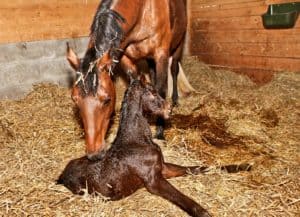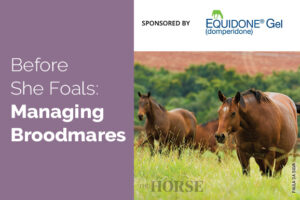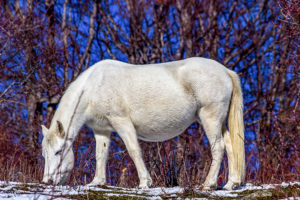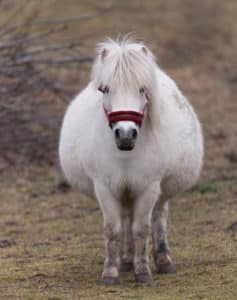
Post-Foaling Red Flags
Watch for these 10 emergencies in the hours after a mare foals. Learn more in this article from The Horse‘s Spring 2024 issue.

Watch for these 10 emergencies in the hours after a mare foals. Learn more in this article from The Horse‘s Spring 2024 issue.

Equip your mare with the nutrition, vaccines, fitness, and foaling environment she needs to
promote a successful parturition and a healthy foal. Sponsored by Equidone.

They found that placentas in gestating mules might overcome species differences through a ‘compensatory mechanism.’

Knowing what to expect and when to call your veterinarian during pregnancy and foaling will help reduce the risk of complications.

Understanding potential problems during your mare’s pregnancy and after the foal’s birth could be the best way to protect them.

The final 100 days of gestation bring their own unique developments, changes, and challenges. Get tips to help your mare’s third trimester run smoothly.

Time is life for a foal. Here’s a look at the top causes of illness in newborn foals and how to manage a sick foal.

Accelerating the foaling process can go well in certain cases, provided vets carefully follow a protocol confirming mare and fetus are ready.

Here’s how to tell whether a broodmare is going into labor or experiencing colic-associated pain.

Learn about the stages of labor and the normal post-foaling chain of events so you can react quickly if issues arise.

Learn how to pinpoint parturition (foaling) so you can avoid surprises and prepare for a healthy delivery.

What horse breeders need to know when dealing with a difficult foaling.

Dr. Regina Turner shared her favorite breeding-related studies on topics ranging from foaling prediction to estrus suppression.

The accelerometer is designed to detect subtle restlessness, the researchers said. Small movements, such as weight-shifting or minor head-bobbing, could be caused by distress related to the first stage of parturition, they said.

A Kentucky Thoroughbred farm is reaping the benefits of healthier mares and foals after making horse pasture renovations over the past year with guidance from University of Kentucky personnel.

Post-foaling colic is a significant threat for mares. Dr. Anthony Blikslager describes what to look for and how to respond if your mare colics following foaling.
Stay on top of the most recent Horse Health news with
© 2022 Copyright Statement dolor sit amet, consetetur sadipscing User Terms, sed diam nonumy eirmod tempor invidunt ut labore et dolore magna aliquyam erat, sed diam voluptua. At vero eos et accusam et justo duo dolores et ea rebum. Stet clita kasd gubergren, no sea takimata sanctus est Lorem ipsum dolor sit amet.
"*" indicates required fields